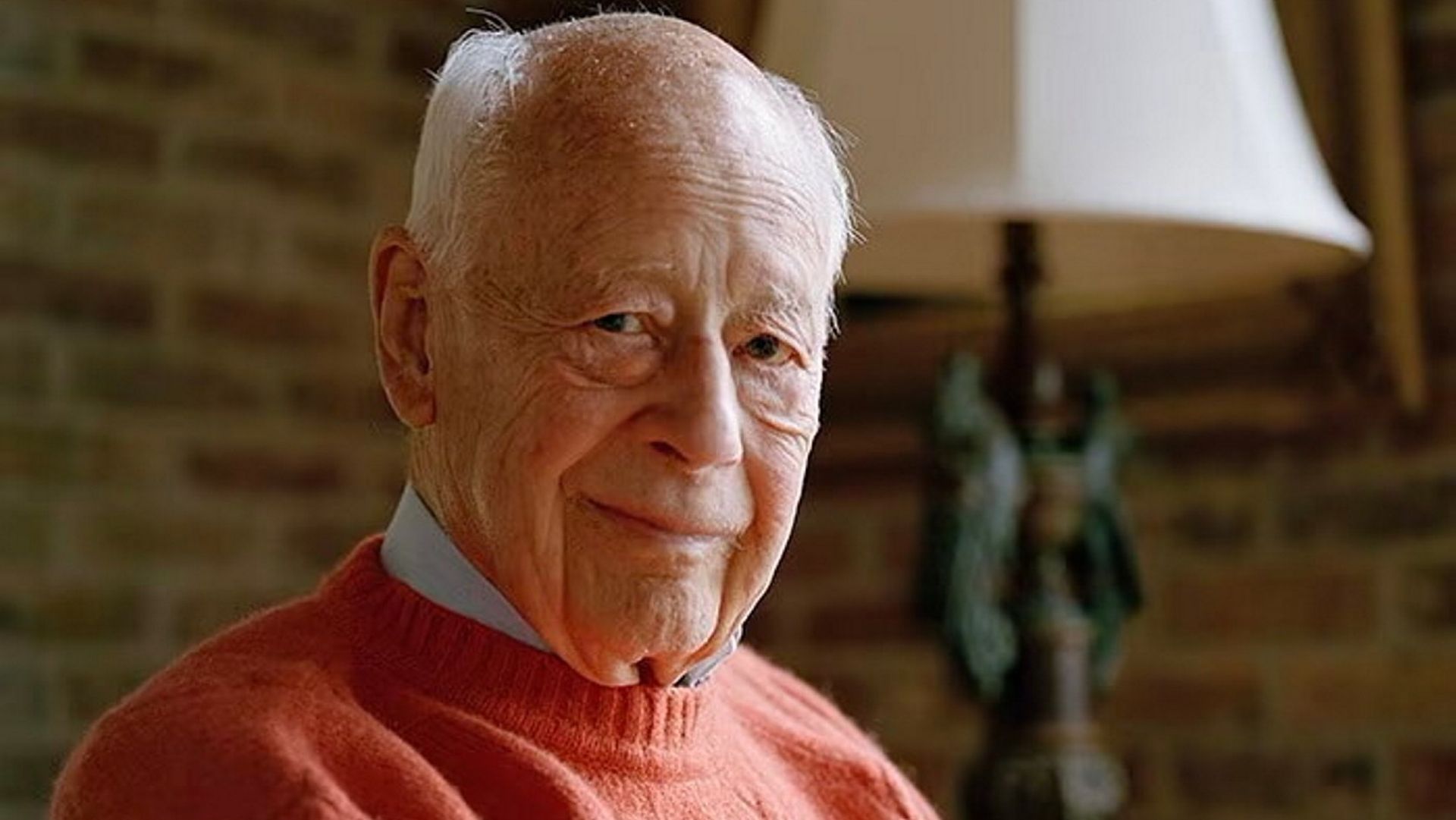尊敬的用户您好,这是来自FT中文网的温馨提示:如您对更多FT中文网的内容感兴趣,请在苹果应用商店或谷歌应用市场搜索“FT中文网”,下载FT中文网的官方应用。


Author, thinker and public speaker Charles Handy, who died on Friday, aged 92, was one of the few non-Americans to merit the description “management guru”.
作家、思想家和公众演讲者查尔斯•汉迪于周五去世,享年92岁。他是少数几位值得被称为“管理大师”的非美国人之一。
It was a term he disliked, preferring the tag “social philosopher”. Handy favoured counselling over consulting for leaders and his chosen method was “Socratic dialogue”. It often took place over a meal at one of his homes in Putney or Norfolk, to which he and his wife Elizabeth invited interesting thinkers, writers and business people.
他不喜欢这个称谓,更喜欢“社会哲学家”这个标签。汉迪更倾向于为领导者提供辅导而不是咨询,他选择的方法是“苏格拉底式对话”。这种对话通常在他位于普特尼或诺福克的家中进行,他和妻子伊丽莎白会邀请有趣的思想家、作家和商界人士共进晚餐。
But Handy’s many insights into organisations, offered in public lectures and a series of books and articles, were practical, prescient and often provocative.
但是,汉迪在公开演讲以及一系列书籍和文章中对组织的诸多见解既实用又有预见性,且常常具有启发性。
In the 1980s and 1990s, he predicted now commonplace innovations in the world of work such as the rise of what would today be called the “gig economy”, the spread of outsourcing, and the growth of the portfolio career. Well into old age, he remained a bold, common sense advocate of human values in companies and a forthright critic of the dangers of breakneck automation. “If the organisation were purely digitised,” he said in a speech in 2017, “it would be a very dreary place, a prison for the human soul.”
在20世纪80年代和90年代,他预测了如今在工作领域中司空见惯的创新,例如今天被称为“零工经济”的兴起、外包的普及以及组合型职业生涯的增长。即使到了晚年,他仍然是公司中人类价值观的大胆、理性的倡导者,也是对急速自动化危险的直言不讳的批评者。在2017年的一次演讲中,他说:“如果组织完全数字化,那将是一个非常沉闷的地方,是人类灵魂的监狱。”
Handy was born in County Kildare, in what is now the Republic of Ireland, son of a Protestant archdeacon. He described himself as “one of the last of the Anglo-Irish”, and had the right to both Irish and UK passports. “Our beginnings do shape our ends,” he wrote in the autobiographical Myself And Other More Important Matters in 2006. “I can feel Irish at heart but still belong physically and emotionally to Britain and, indeed, to Europe.”
汉迪出生在基尔代尔郡,现在属于爱尔兰共和国,是一位新教会长的儿子。他自称是“最后的盎格鲁-爱尔兰人之一”,并有权持有爱尔兰和英国的护照。在2006年的自传《我自己和其他更重要的事情》中,他写道:“我们的起点确实塑造了我们的终点。我可以在内心感到自己是爱尔兰人,但在身体和情感上仍属于英国,甚至属于欧洲。”
He read “Greats” at Oriel College, Oxford — a mixture of classics, history and philosophy — adding a foundation of ancient thought to his work. A central concept, from Aristotle, was the quest for eudaemonia, or fulfilment, which Handy interpreted as “doing the best at what you’re best at”.
他在牛津大学的奥里尔学院(Oriel College)学习“伟大著作”课程,这是一门结合了古典文学、历史和哲学的课程,为他的工作奠定了古代思想的基础。一个核心概念来自亚里士多德(Aristotle),即追求eudaemonia,也就是成就感,汉迪将其解释为“在你最擅长的领域做到最好”。
Handy joined Shell International as a marketing executive at a time when the company represented the acme of postwar managerial best practice. It was his only experience of working as a corporate employee and fed a deepening pool of personal stories that he later shaped, distilled and used to dramatic effect in his books, lectures and broadcasts.
汉迪加入壳牌国际(Shell International)担任营销主管时,公司正代表着战后管理最佳实践的巅峰。这是他唯一一次作为企业员工的工作经历,并为他积累了大量个人故事,这些故事后来被他提炼、加工,并在他的书籍、讲座和广播中产生了戏剧性的效果。
In the 1960s and 1970s, Handy was a pioneer of British business education, bringing the relatively novel idea of executive education back from a stint at MIT’s Sloan School of Management to London Business School, where he taught a version of the US programme.
在20世纪60年代和70年代,汉迪是英国商业教育的先驱之一。他从麻省理工学院斯隆管理学院学习了一段时间后,将相对新颖的高管教育理念带回伦敦商学院(London Business School),并在那里教授了一个美国课程的版本。
In 1981, though, he took the leap into what he would later call the “portfolio life”. He stepped off the education treadmill and went freelance. The change of direction gave him the time and freedom to write a series of books on modern organisations, including The Age of Unreason (1989) and The Empty Raincoat (The Age of Paradox in its US version) (1994), in which he tackled the paradoxes and challenges of economic progress and the changing workplace. The transition also entailed what he later described as a rewriting of his “marriage contract” with Liz. She resumed her career as a photographer and — compensating for Handy’s initial reluctance to charge a speaker fee — became his business manager, agent and image consultant.
然而,在1981年,他勇敢地迈入了他后来称为“组合生活”的领域。他离开了教育界,开始自由职业。这一转变为他提供了时间和自由,撰写了一系列关于现代组织的书籍,包括《非理性的时代》(1994年),在这些书中,他探讨了经济进步和职场变化的悖论和挑战。这一转变还意味着他后来所描述的与莉兹“婚姻契约”的重写。莉兹重新开始了她的摄影师职业,并且——为了弥补汉迪最初不愿收取演讲费的态度——成为了他的商务经理、代理人和形象顾问。
Handy’s lucid, conversational prose was characterised by the use of vivid metaphors. These included the “shamrock organisation”, an early description of a company’s network of staff, contractors and part-timers, and “the elephant and the flea”, his image for the symbiotic relationship between large multinationals and independent workers, drawn from his 2001 book of the same name.
汉迪的散文语言清晰、娓娓道来,其特点是使用生动的比喻。其中包括“三叶草组织”,这是对公司员工、承包商和兼职人员网络的早期描述;以及“大象和跳蚤”,这是他在2001年同名书中描绘的大型跨国公司与独立工人之间共生关系的形象。
In The Second Curve (2015), Handy replayed some of his greatest hits but it was also full of radical proposals for change in areas as different as measuring the economy and organising British democracy. He also wrote how he had resolved as he grew older to “remain interesting to the generation below me, be it by wit or wisdom, occasionally seasoned with some judicious generosity”. He and Liz, who died in a car accident in 2018, lived up to that resolution.
在《第二曲线》(2015年)中,汉迪重温了一些他最伟大的成就,但书中也充满了在衡量经济和组织英国民主等不同领域的激进变革提议。他还写道,随着年龄的增长,他决心“通过机智或智慧,偶尔加上一些明智的慷慨,让我对下一代保持有趣。”他和2018年因车祸去世的莉兹践行了这一决心。
Handy also remained a genial but wily marketer of his brand. Asked in 2015 by one admirer to offer an endorsement for a new book, Handy emailed back “I never do blurbs” but added that he was happy to write a foreword — the sort of “judicious generosity” that also ensured his name appeared on the front cover.
汉迪仍然是他品牌的一个和蔼但狡猾的营销者。2015年,一位崇拜者请他为一本新书提供推荐语,汉迪回复说:“我从不写推荐语”,但补充说他很乐意写一篇前言——这种“明智的慷慨”也确保了他的名字出现在封面上。
His determination to disseminate his ideas continued to shine through even after a stroke in 2019. Impatient with the strictures of hospital, he persuaded nurses to pin a note above his bed reading “Charles Handy Is Allowed To Do Whatever He Wants To Do”, and laid plans to write about his experience.
即使在2019年中风后,他传播自己思想的决心依然熠熠生辉。他对医院的限制感到不耐烦,于是说服护士在他的床头上方贴了一张纸条,上面写着“查尔斯•汉迪可以做任何他想做的事”,并计划撰写关于他经历的文章。
He died peacefully at home, surrounded by family. He leaves behind two children, Scott and Kate, and four teenage grandchildren, to whom he dedicated his 2020 book 21 Letters on Life and Its Challenges.
他在家中安详去世,家人陪伴在侧。他留下了两个孩子,斯科特和凯特,以及四个十几岁的孙子孙女,并将2020年出版的《21封关于生活及其挑战的信》献给了他们。
He continued to do the best at what he was best at until the end. A final book, The View from Ninety: Reflections on Living a Long, Contented Life, will appear next year.
他一直坚持做到自己最擅长的事情,直到生命的尽头。他的最后一本书《九十岁的视角:关于长寿与满足生活的思考》将于明年出版。
In 2017, Handy gave the closing speech at the Global Peter Drucker Forum, a conference in honour of another reluctant management guru whose work he admired. He closed with a rallying cry for a management revolution. “Let us start small fires in the darkness until they spread and the whole world is alight with a better vision of what we could do with our businesses,” he declared to a standing ovation.
2017年,汉迪在全球彼得•德鲁克(Peter Drucker)管理论坛上发表了闭幕演讲,这是一场纪念他所钦佩的另一位不情愿的管理大师的会议。他以呼吁管理革命的号召结束演讲。在全场起立鼓掌时,他宣布:“让我们在黑暗中点燃小火,直到火势蔓延,整个世界都为我们的企业所能做的事情树立了更好的愿景。”